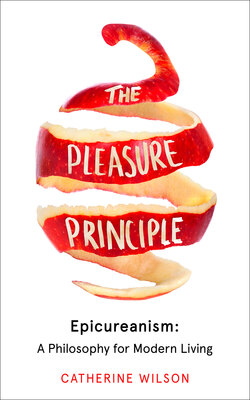The Pleasure Principle

Реклама. ООО «ЛитРес», ИНН: 7719571260.
Оглавление
Catherine Wilson. The Pleasure Principle
Copyright
Contents
Preface
Note on the Text
Back to Basics
The Epicurean Atom
Atomism: Three Consequences
How Did We Get Here?
The Epicurean Theory of Natural Selection
Darwin’s Upgrade: How Selection Causes Evolution
The Material Mind
The Mystery of Consciousness
The Evolution of Consciousness
The Story of Humanity
The State of Nature and the Rise of Civilisation
Authority and Inequality
The Lessons of the Past
Ethics and the Care of the Self
Pleasure and Pain
Prudence and its Limits
Hedonism and its Problems
Don’t Suffer in Silence!
The Pleasure Merchants
Morality and Other People
Morality vs Prudence
Moral Truth and Moral Progress
Why Be Moral?
What’s Different About Epicurean Morality?
Beware of Love!
The Epicurean Exception
The Pains and Pleasures of Love
Sexual Morality: Minimising Harm to Others
Using Your Head
Thinking About Death
The Epicurean View of Death
Death at the Right and Wrong Times
Abortion vs Infanticide
Suicide vs Euthanasia
Resisting and Accepting Mortality
Don’t Count on the Afterlife
What Is Real?
Nature and Convention
Things in Between
Human Rights: Natural or Conventional?
The Imaginary: Unthings
The Reality of the Past
What Can We Know?
The Importance of First-Person Experience
Resolving Disagreement
Is Empiricism True?
Science and Scepticism
Scientific Explanation
Can We Trust the Scientists?
Living with Uncertainty
Social Justice for an Epicurean World
Three Epicurean Philosophers on War, Inequality and Work
Epicurean Political Principles
Justice for Women: Nature, History and Convention
Religion From an Epicurean Perspective
Belief in the Imaginary
Piety Without Superstition
Can Religion Be Immoral?
Can a Religious Person Be an Epicurean?
The Meaningful Life
Two Conceptions of the Meaningful Life
Meaningfulness for the Individual
The Problem of Affluence
The Philosophical Perspective
Should I Be a Stoic Instead?
The Stoic System
Too Much Fortitude?
Wrapping Up
Bibliography and Suggestions for Further Reading
Preface
1: Back to Basics
2: How Did We Get Here?
3: The Material Mind
4: The Story of Humanity
5: Ethics and the Care of the Self
6: Morality and Other People
7: Beware of Love!
8: Thinking About Death
9: What Is Real?
10: What Can We Know?
11: Science and Scepticism
12: Social Justice for an Epicurean World
13: Religion From an Epicurean Perspective
14: The Meaningful Life
15: Should I Be a Stoic Instead?
Suggestions for Further Reading
Acknowledgements
About the Publisher
Отрывок из книги
List of Pagesiiiiv1234567891011131517192021222324252627293132333435363738394041424345464748495051525355575859606162636465666769717374757677787980818283848586878889909192939495979899100101102103104105106107108109111112113114115116117118119120121122123125126127128129130131132133134135136137138139140141142143144145147149151152153154155156157158159160161162163164165166167168169171172173174175176177178179180181182183184185187189190191192193194195196197198199200201202203205207208209210211212213214215216217218219220221222223225227228229230231232233234235236237238239240241242243245246247248249250251252253254255256257258259261263264266267268269270271273274275276277278279280281282283284285286287288289290291292293295
.....
Central to their understanding and to their views on social equality was their distinction between nature and what they termed ‘convention’. By nature they meant the realm of living things – what we would call the plant and animal kingdoms – along with light and fire, the varied landscapes and waterscapes of our planet, and its celestial objects, the sun, moon and stars. Nature, they recognised, presents an ever-changing spectacle, but it is in many ways predictable. The seasons come around on a regular basis, and animals produce offspring that resemble them from generation to generation. Fire can be counted upon to burn dry straw.
By convention the Epicureans meant perceptions, attitudes and beliefs dependent on our specifically human constitution and reflected in our categories and the words we use. Epicurus’s Greek forerunner, the philosopher Democritus, stated: ‘By convention sweet, by convention bitter, by convention hot, by convention cold, by convention colour: but in reality, atoms and the void.’ The sweetness of honey and the bitterness of rocket depend on our taste receptors, and colours, too, are perceived differently by different animal species and even by different individual humans. Poverty and marriage are not found in nature; they are understood differently by different groups of humans and have different implications, depending on where you are and what group you identify with.
.....